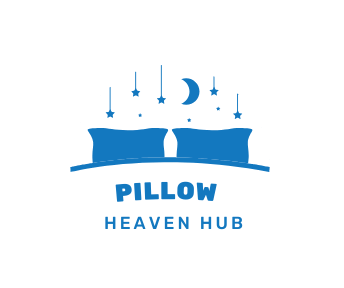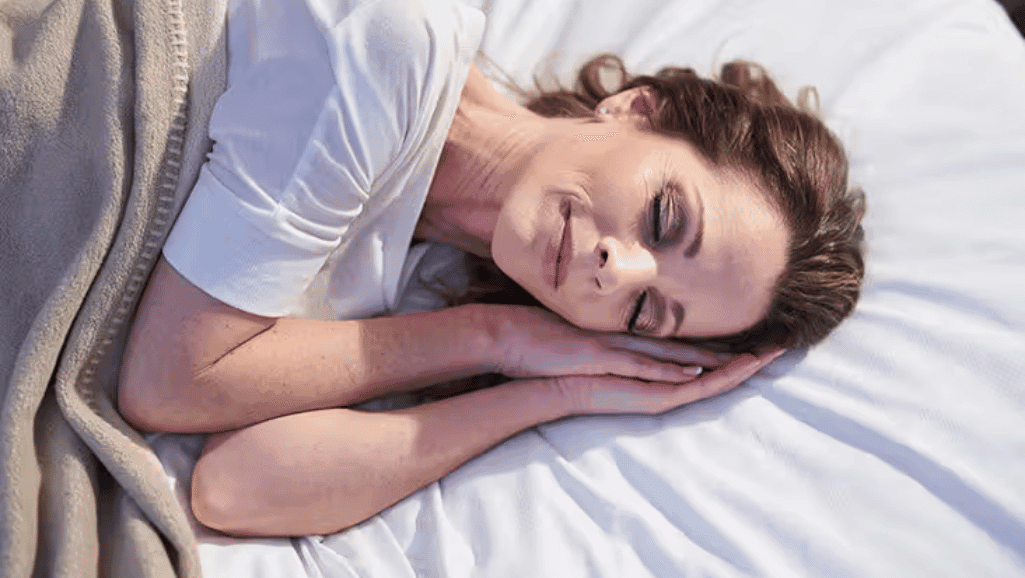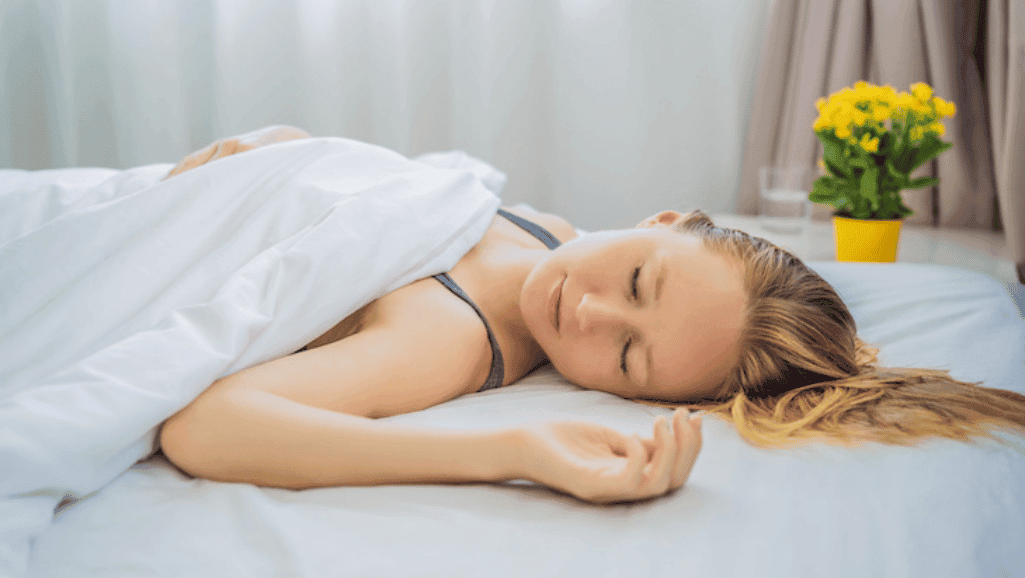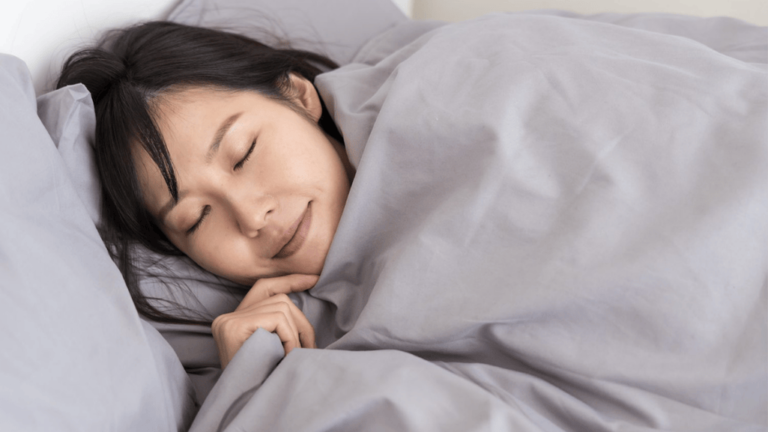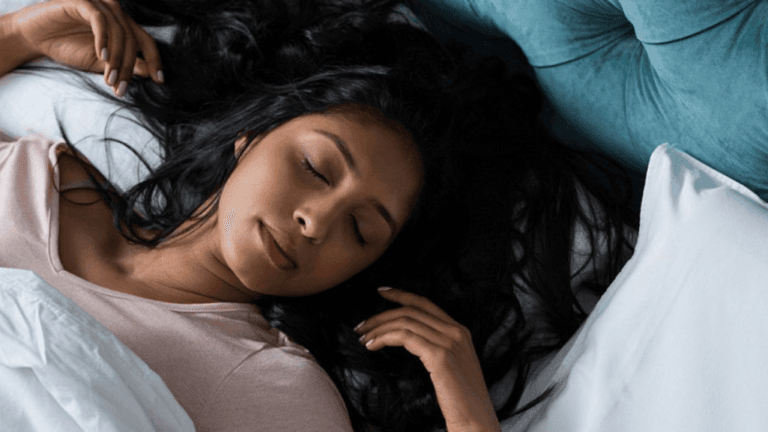Many people wonder if sleeping without a pillow is good for them. There’s not a lot of direct study on this topic. Traditionally, pillows are important for supporting the spine’s natural curve. But, stomach sleeping without the right pillow support might hurt more than help.
Experts from the University of Rochester Medical Center point out this issue. They say there’s limited research on the actual benefits of not using a pillow for sleep.
If you sleep on your stomach, not using a pillow might help. It can make your head lie flatter, which could ease neck and back strain. This might lead to better spine health without pillow. But, if you’re used to sleeping on your back or side, not using a pillow could be hard on your muscles and joints.
Without a pillow, your spine might not be in a good position while you sleep. So, the choice to sleep without one isn’t perfect for everyone.
Thinking of trying to sleep without a pillow? You could start by using a folded blanket or towel. This helps make the change less sudden and keeps your sleeping position natural.
Key Takeaways
- When thinking about sleeping without a pillow, your sleeping position is important to consider.
- People who sleep on their stomachs might see benefits in their neck and back by not using a pillow.
- For a good night’s sleep, correct alignment is crucial. Although, stomach sleepers have a chance to do this without a pillow.
- While research is important, we mostly know about the type of pillows, not about going without one.
- Using a folded blanket first can help make the transition to a pillowless sleep easer.
Understanding the Role of Pillows in Sleep Quality
Pillows play a big role in how well we sleep. They support our spine and make sure our neck feels comfy. How we sleep and the pillows we use affect our rest. This shows the tricky balance between being comfy, our body positions, and health.
The Purpose of Pillows for Spinal Alignment
Pillows are key to sleeping in a natural position. They align our spine and help reduce pressure on our back and neck. Those who sleep on their back or side need pillows to keep their spine straight. This is important for not waking up with pains. Yet, research shows people who sleep on their stomach might do better without a pillow. This can help their spine align naturally, reducing back stress.
How Pillows Influence Neck Support and Comfort
The argument about sleeping without pillows goes on. But, it’s clear that the type and position of a pillow can really help our neck and overall comfort. Pillows for side sleepers are best when they keep the head and neck level. This reduces strain. On the other hand, back sleepers should use thin pillows. This stops the neck from bending too much.
Surprisingly, stomach sleepers might find peace without pillows. This can lessen neck strain. It lets the head rest naturally, easing nerve issues and helping blood flow smoothly.
How you use pillows, or not, can really change how you sleep and your health. Not using any pillows might help with morning headaches. Some studies think this is because it lets blood flow better when our heads are lower. On the other hand, the right pillows can keep your face clear from acne. They stop your skin from touching oils and dirt on pillowcases.
Exploring the Potential Benefits of Pillowless Sleep
Not using a pillow while sleeping is getting more popular because of its health perks. It might help us sleep in a more natural way. This can make our back straighter and feel more comfortable.
If you sleep without a pillow, it can ease pain in your neck and back, especially if you sleep face down. This way of sleeping can make your back stretch out. It could stop your neck from getting so sore, and you’ll get up with fewer headaches.
- You get better blood flow which makes you healthier and more alive.
- You might not get allergies and breathing problems like asthma because there are fewer allergens around.
- Your chances of getting acid reflux or heartburn could go down, because laying flat helps your stomach.
- You might snore less or have less trouble with sleep apnea because laying straight helps your airway.
Although sleeping without a pillow sounds good, what works best varies for everyone. It’s not always good for people who sleep on their sides. They might need a pillow to support their head and neck.
So, skipping the pillow might make some people healthier if it fits how they naturally sleep. It could be good for those with certain health issues. It’s a good idea to try sleeping without a pillow and see if it helps with your own problems like neck pain or bad sleep.
The Influence of Sleeping Posture Without a Pillow
Our nightly habits reflect on the role of pillows and how we sleep. Choosing to sleep without a pillow can bring both good and bad results. This is especially true for those who are used to having one.
Prospects for Stomach Sleepers: Is Less More?
Stomach sleepers might feel better without a pillow. The University of Rochester Medical Center explains that sleeping on the stomach can be improved this way. Sleeping without a pillow makes the spine straighter, eases weight on the body, and cuts down on spinal stress strongly.
This can help align the body better. It might lower the chance of waking up with back or neck pain. This is why stomach sleepers can find a lot of benefit in not using a pillow.
Back and Side Sleepers: Assessing the Risks
Back and side sleepers, however, might find it hard to get used to no pillow. The spine can twist unnaturally, causing more neck pain and discomfort. Without a pillow, the neck muscles might be under extra pressure, leading to morning headaches or worse neck pain.
It’s important to keep the spine well-supported. A mattress that doesn’t give the right support can make problems worse. Starting with a folded blanket to ease into no pillow can help adjust better.
It’s clear stomach sleepers may gain from not using a pillow. But for back and side sleepers, it’s important to be careful. They should be aware of the possible discomfort and make changes for a healthy sleeping posture without a pillow.
For more details on sleeping without a pillow and its health aspects, visit Healthline.
| Sleep Position | Impact on Spine | Adjustment Recommendation |
|---|---|---|
| Stomach Sleeping | Decreased spinal stress | Minimal to no pillow |
| Back and Side Sleeping | Potential for increased neck strain | Strategic use of pillows for support |
The Connection Between Pillow Use and Spine Health
Pillows are key for spine health without pillow. They keep our spine in a good position while we sleep. This helps avoid pain and keeps our spine balanced. For those who sleep on their stomach, the University of Rochester Medical Center says sleeping without a pillow might be better. This can help take pressure off the neck and back. It may help your spine stay healthier.
Sleeping on your side or back is different. Without a pillow, your body might not stay aligned well. This can cause stress on your spine. So, each person’s spine needs vary based on how they sleep.
To get used to spine health without pillow, try to use a pillow less each night. This helps your body get used to less head support. Remember, a good mattress is crucial when you stop using a pillow. It stops your spine from bending too much and helps you avoid back pain.
If you want to know more about sleeping without a pillow, check out this detailed guide here.
Understanding how pillows affect our spine health is vital. It helps us sleep better and make choices for a healthier back. This leads to more refreshing sleep.
Analysis of Sleep Habits and Pillowless Benefits
Many people find they sleep better without a pillow. For stomach sleepers, this can mean less neck pain and a more aligned spine. By sleeping without a pillow, you can promote a natural sleeping position and avoid the discomfort of misalignment.
Can Forgoing a Pillow Lessen Neck Pain?
Studies show that not using a pillow may help stomach sleepers reduce neck pain. This is because you avoid sleeping in strange angles that hurt your neck. Without a pillow, your neck doesn’t have to bend weirdly either. This can also help your back stay pain-free by keeping your spine in a good position.
Ideas for Contouring to Natural Sleeping Positions
Learning to sleep without a pillow takes time. You can start with something soft under your head, like a folded towel. This gives you slight elevation and helps your body get used to the change. It’s a good way to ease into sleeping without any pillow.
- Supportive Body Positioning: Putting something under your stomach or pelvis could keep your spine straight, making it easier to adjust and reducing back stress.
- Adjustable Bed Settings: On adjustable beds, you can slightly incline the top to mimic the spine’s natural shape. This encourages better sleeping positions.
Moving away from pillows can make your sleep better and your spine healthier. To make this change, go slowly, consider other support, and be patient. Your body will get used to new ways of sleeping.
Pros and Cons: Is It Healthy to Sleep Without Pillow?
Is it healthy to sleep without a pillow is a question with no one-size-fits-all answer. It really depends on how you sleep. For example, sleeping without a pillow can help stomach sleepers. It may improve spine alignment, lower neck pain, and make sleeping more natural. But, for those who sleep on their back or side, not using a pillow could cause neck problems and bad posture.
Doctors say each person should make their own choice about pillows, especially if they have health issues. The way you sleep can really affect whether sleeping without a pillow is good for you or not.
- Stomach Sleepers: Getting rid of a pillow may actually feel best for you. It lets your neck and spine come into better alignment, possibly reducing pain and pressure.
- Side Sleepers: It’s usually not recommended for you to go pillow-less. Without one, your spine and neck might not line up well, leading to more pain and stress.
- Back Sleepers: Even just a thin pillow is important. It helps keep your head and neck at the right level, maintaining a straight spine.
When it comes to keeping your spine healthy, most experts stress the need to match your pillow situation with what your body needs and finds comfortable. Here’s what they typically suggest:
| Condition | Recommendation |
|---|---|
| General Spine Alignment | Use a thin pillow or none for stomach sleepers. Back and side sleepers should choose something supportive. |
| Neck Pain | To lessen head support over time, try a folded towel to see what feels best for you. |
| Obstructive Sleep Apnea (OSA) | A pillow might help by lifting your head. Yet, each person’s needs can differ. |
So, should you sleep without a pillow? Consider your usual sleeping style and health issues before deciding. It might be great for how you sleep if you’re a stomach sleeper. But, it’s crucial to think about what’s best for your health overall. Getting advice from a doctor can help make the best choice for both your comfort and well-being.
Integrating Proper Sleeping Alignment Without Pillows
Deciding to sleep without a pillow is a big step. It’s about finding a more natural way to rest. This change can bring better health and comfort. But, it’s important to think about your sleeping style and make sure your bedroom helps.
Finding Balance: Tips for Transitioning to No-pillow Sleep
Getting used to sleeping without a pillow takes time. It’s to avoid pain and let your body get used to new positions. Here’s what you can do:
- Begin with a towel or a folded towel to lower the height little by little. This helps your body learn to sleep without much help.
- You can also add support under your knees or back with a rolled towel or a small pillow. It keeps your body in a proper position.
- Over several weeks, make the support thinner. This goes on until you can sleep without something under your head.
This slow change is good for your spine and sleep habits. It might also help with neck and back pain.
Choosing the Right Mattress to Complement Pillowless Sleep
Without a pillow, your mattress becomes more important for your spine. You should pick a mattress that fits the curves of your body. Here’s what to look for:
- Firmness: A mattress that is medium-firm is usually a good choice. It gives support and lets your hips and shoulders sink a bit.
- Material: Memory foam and latex mattresses shape to your body and spread your weight. This reduces stress on your body.
- Support: Look for mattresses that have extra support in certain areas, like the lower back. This gives more support where it’s needed.
Choosing the right mattress is key for going pillow-free. It helps you sleep better by keeping your body in the right line while you sleep.
Without a pillow, a good mattress, and right sleep habits, you can improve your health. These steps lead to better posture and more peaceful nights. They let your body rest the way it needs to, for a fresh start every morning.
Investigating the Effects of Sleeping Without Pillow on Hair and Skin
The effects of sleeping without a pillow captivate health enthusiast and researchers. It’s not clear how it affects skin and hair. Yet, not using a pillow can align the spine better for stomach sleepers. This is known.
Skipping the pillow might keep hair’s natural oils and stop breakage, say some. There’s not much proof it’s true, though. Also, not having a pillow might help avoid facial wrinkles. But, solid proof is missing.
Now, experts focus on how you sleep and what you sleep on, not just the pillow being there or not. If you sleep on your back without a pillow, it might help lessen wrinkles. Still, skin health factors in skin type, age, and the air we live in.
Deciding to sleep without a pillow really depends on what feels best for you and what’s good for your health. As more studies come out, we might learn more about the pros and cons of sleeping without a pillow. For now, go with what makes you feel the most comfortable.
Case Studies: Pillowless Sleep Benefits Realized
Looking at those who sleep without a pillow gives us a new view. We see possible health benefits over using a pillow. People who skip the pillow say it’s better for their spine and they are comfortable without one.
From Chronic Pain to Relief: Narratives of Pillowless Sleepers
Many folks, especially stomach sleepers, find relief without a pillow. They mention less neck and upper back pain. This happens because sleeping directly on the mattress can help align the spine better.
These stories suggest that not using a pillow, if done right, could be beneficial. Making sure the mattress is supportive is also crucial.
Experts Weigh in on Long-term Health Impacts
Health pros remind us not to rush into pillowless sleep. It’s good for some, causing less back pain and better posture. But this doesn’t fit everyone, especially not for those who sleep on their back or side.
The idea that no pillow can help with wrinkles is up for debate. Most skin experts say your sleep position matters more. They think sleeping well is key for good skin and hair, pillow or not.
Specialists advise slowly getting used to no pillow and watching for discomfort. This lets you know if it’s right for you. Not everyone will benefit from this change.
Putting all this together, it shows sleep is personal. The question of pillowless sleep varies, depending on your health and how you sleep. It’s all about what works for you.
Conclusion
Various sleeping styles lead to different health impacts, posing the question is it healthy to sleep without a pillow. It’s not a simple yes or no. For certain people, like those who find discomfort with pillows, not using one can be helpful. This group might experience better posture and less stress on their back.
Yet, a large number of participants in our research, more than half, linked their poor sleep to pillow discomfort. This shows needing a pillow designed for your personal comfort and spinal support is crucial. Such support helps you sleep better and without pain.
For side sleepers, not having a pillow can be worse. It can lead to waking up with a sore neck due to bad spinal alignment. Choosing the right type of pillow, such as one filled with feathers, is also key for good sleep. Our data shows a clear link between uncomfortable pillows, bad sleep, and morning pain.
The choice on sleeping with or without a pillow depends on your health and how you sleep. Talking to a doctor is a good idea, especially if you have health issues like neck or back pain. Sleeping without a pillow isn’t for everyone, but finding the right one is important for a peaceful night.
We must strive for the best sleep quality, whether using a pillow or not. The goal is to enjoy sleep that’s good for our body and free of pain. So, making sure you’re comfortable and supported while sleeping is critical for your health.
